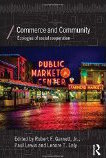Polycentric Innovation
The selection of articles below explores various aspects of polycentric innovation and the conditions necessary that allow entrepreneurs of all stripes to pursue ways to improve their industry, the culture, and their communities.
Michael Munger on Permissionless Innovation
From EconTalk
By Russ Robert
Munger discusses permissionless innovation, which he considers the most important concept in political economy. Permissionless innovation occurs in a society that strongly favors experimentation and allows actors to overcome permission from regulators and competitors (such as food trucks getting permission from restaurants). Munger describes this emergent creativity as a dance using the words of an 18th German poet named Friedrich Schiller. This dance allows actors in a society to create new things that can make everyone better off, even if regulators and experts don’t understand their value.
Treat People as Citizens: Why Rule by the People is Better than Rule by the Experts
From Aeon
By Nicholas Tampio
Tampio warns us about the epistocracy (rule of experts) threatening to emerge from the growth of Big Data and the practice of nudging; that is, the government creating a choice architecture for the public. The intersection of both – Big Nudging – is a way for public and private engineers to subtly shape the choices citizens make on the internet through auto filling or prioritizing government-preferred results. He defends the value of democracy and the ability of citizens to wisely govern themselves and take civic action for the common good. He poignantly remarks, “There is no algorithm that can replace entrusting people to do the hard work of running community affairs.”
Bill Gates Tacitly Admits Common Core Experiment Failure
From The Federalist
By Joy Pullman
Pullman shines a light on the failure of the Gates’ Foundation attempt to improve national education standards through the Common Core. Using $400 million of their own money and leveraging trillions of taxpayer dollars, Bill and Melinda’s education initiative has failed to improve the performance of public schools. Broadly speaking, the Common Core is a representative failure of Gates’ approach to philanthropy, which seeks to use big philanthropy to alter government structures and leverage taxpayer dollars. In response to the debacle, Pullman offers a litmus test for large-scale philanthropic initiatives that other philanthropists would do well to heed: first do no harm.
Radical Social Entrepreneurs: An Introduction to Strong’s Law
By Michael Strong
Strong considers how the tendency for entrepreneurs to continuously improve technology could be applied to human systems. Given the opportunity social entrepreneurs and cultural innovators could increase the efficiency and customization of everything from law and governance to happiness and wellbeing.




